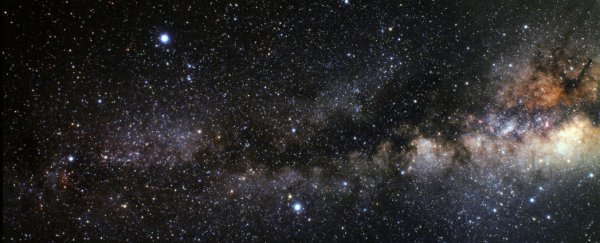Scientists think they have a pretty good idea of how old the Universe is, but its age can depend on exactly where you are in it. Because of the time it takes for light to travel, observers on a planet other than Earth could well come up with a different calculation.
As astrophysicist Ethan Siegel explains at Medium, a number of different indicators suggest the Big Bang occurred some 13.8 billion years ago (with an error margin of around 120 million years either way). From Earth we see stars and galaxies not as they are, but as they were when light first left them, still, the differences on a scale of 13.8 billion years aren't very significant. Even for a constellation 100,000 light years away, for example, you're talking about a calculated age of 13,799,900,000 years rather than 13,800,000,000.
On planets other than Earth, however, the difference could start to become significant. Siegel points out that if there are planets moving at several thousand kilometres per second - or close to the speed of light - the Universe would look rather different from their perspective: these planets would be significantly younger than everything else that makes up the cosmos. If you were moving at 99 percent the speed of light since the time when the Universe was 1 billion years old, for example, you would have effectively lived through 1.8 billion years rather 13.8 billion.
To the rest of us, these planets would appear to be at the very early stages of development. This doesn't change the fact of how old the Universe actually is, but it means those in a galaxy travelling close to the speed of light wouldn't necessarily believe the figures if you told them.
"So the Universe should appear the same for almost all observers anywhere, with the same amount of time having passed and the Universe having the same large-scale properties pretty much everywhere," explains Siegel. "But for a few select observers - the ones who've spent some significant time moving close to the speed of light relative to the CMB's [cosmic background radiation] rest frame - the Universe will be quite bizarre. As soon as they slow down relative to the CMB and come to rest, they'll find themselves as young ones in a strangely old Universe."
That's not to say such galaxies do exist - in fact, we don't have any evidence of them right now - but it's an interesting look at how speed and light combine to influence our concept of time. With the right calculations and data to pull from, those on such rapidly moving planets would be able to come to the same 13.8 billion figure, but their own existence would look very nascent compared to those around them.
And speaking of the Big Bang theory, here's why we should never have called it that in the first place:
